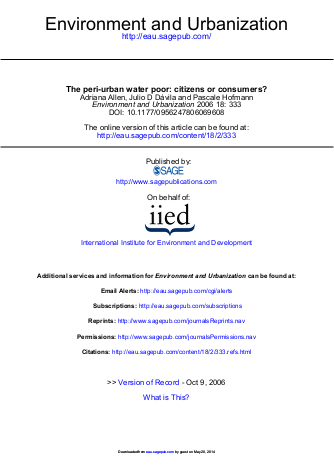
Using the results of a comparative three-year research project in five metropolitan areas, this article reviews a range of practices in accessing water and sanitation by peri-urban poor residents and producers. It starts from the observation that neither centralized supply policies nor the market through, for example, large-scale profit-making enterprises are able to meet their needs. Although they are consumers insofar as they have no option but to pay market prices for water (and often for sanitation), the peri-urban poor are, in practice, sometimes regarded as citizens with basic entitlements such as the right to water. This article outlines a conceptual distinction between “policy-driven” and “needs-driven” practices in the access to peri-urban water and sanitation services. The case studies show that this access is mainly needs-driven and informal rather than the result of formal policies. The key to structural improvements in water and sanitation lies in the recognition of these practices and their articulation to the formal system under new governance regimes.
Resource collections
- Evaluating humanitarian action
- Monitoring and Evaluation (M&E)
- Monitoring of humanitarian action
- UN Habitat - Urban Response Collection
- Urban Response - Urban Crisis Preparedness and Risk Reduction
- Urban Response Collection - Community Engagement and Social Cohesion
- Urban Response Collection - Economic Recovery
- Urban Response Collection - Environment and Climate Change
- Urban Response Collection - Housing, Land and Property
- Urban Response Collection - Urban Crisis Response, Recovery and Reconstruction
- Urban Response Collection - Urban Resilience
- Use of evaluation evidence